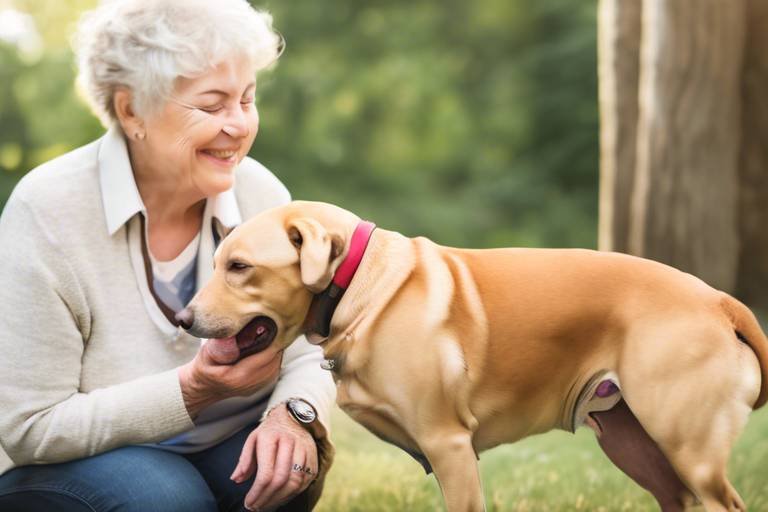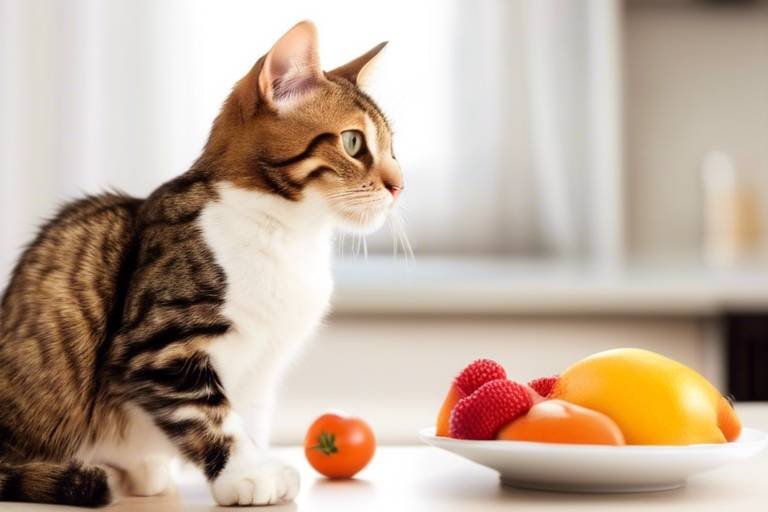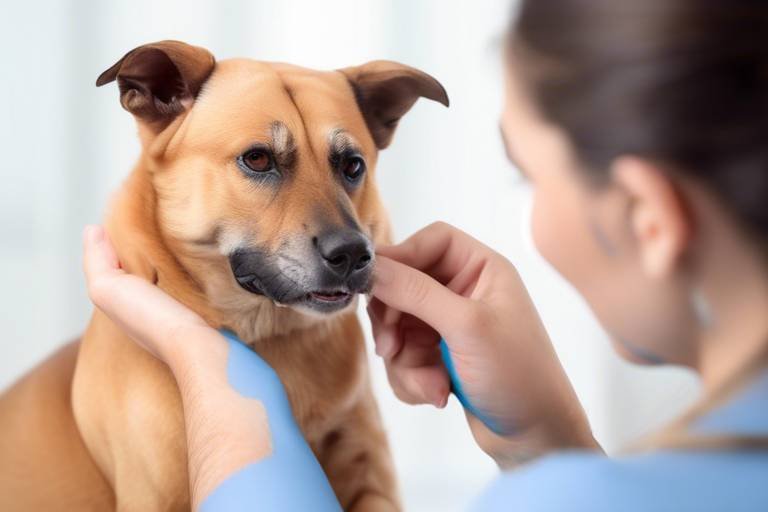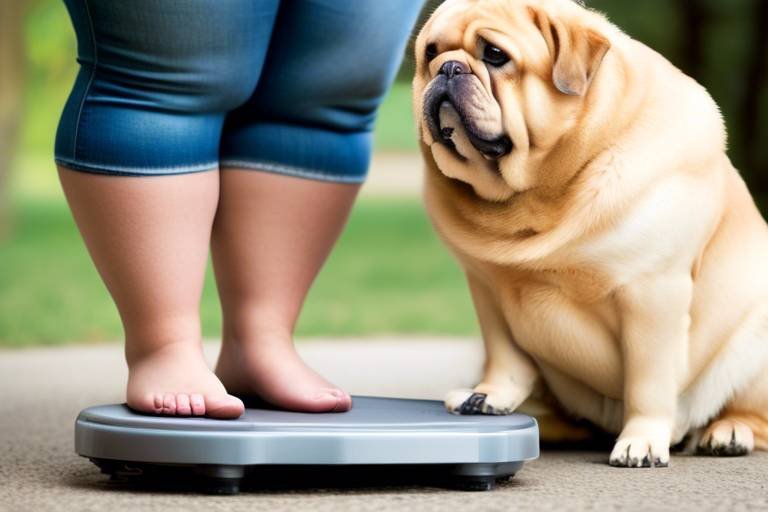How to Help Your Pet Transition to Senior Life
As our furry companions age, they undergo a variety of changes that can affect their health, behavior, and overall quality of life. Transitioning your pet into their senior years can feel like navigating a maze—challenging and sometimes overwhelming. But fear not! With the right approach, you can make this journey smoother for both you and your pet. This article will guide you through the essential aspects of caring for your senior pet, focusing on their health, nutrition, and emotional well-being.
As pets age, their physical and emotional needs change significantly. Just like humans, older pets may experience a decline in mobility, vision, and even cognitive function. It's crucial to recognize these shifts so that you can provide the appropriate care and ensure their comfort during this stage of life. For instance, a once-active dog may now prefer lounging on the couch, and a cat that used to leap onto high shelves may need assistance getting to their favorite sunny spot. Paying attention to these changes allows you to adapt your care routine and make necessary adjustments to their environment.
Nutrition plays a vital role in the health of senior pets. As they age, their dietary needs change, and tailoring their diet can significantly enhance their quality of life. A well-balanced diet can support their overall well-being, helping them maintain a healthy weight and manage age-related issues. It’s essential to choose food that is specifically formulated for senior pets, as these products often contain the right balance of nutrients to support their aging bodies.
Selecting high-quality food is crucial. Look for options that focus on:
- Weight management: Senior pets are often less active and may gain weight easily.
- Digestive health: Foods rich in fiber can aid digestion and prevent constipation.
- Essential nutrients: Ingredients that support joint health and cognitive function are vital.
Consulting with your veterinarian can help you identify the best diet for your pet's specific needs.
Don’t forget about hydration! Ensuring that your senior pet stays hydrated is essential, as they may be more susceptible to dehydration. Fresh water should always be accessible, and consider adding a pet fountain to encourage drinking. Just like us, pets can sometimes forget to hydrate, especially if they’re not feeling well.
Consider adding supplements to your senior pet's diet to support joint health, cognitive function, and overall vitality. Common supplements include glucosamine for joints and omega-3 fatty acids for skin and coat health. Always consult your veterinarian for personalized recommendations, as they can guide you on what is best for your furry friend.
Regular veterinary check-ups are crucial for senior pets. Keeping an eye on health changes allows for early detection of potential issues, ensuring timely intervention and care. Schedule bi-annual vet visits to monitor your pet’s health closely. Remember, a small change in behavior or appetite can sometimes signal a bigger issue.
A safe and comfortable home can significantly improve the quality of life for senior pets. Adjustments may be necessary to accommodate their mobility and sensory changes. For example, if your pet has trouble with stairs, consider adding a ramp or relocating their favorite spots to more accessible areas.
Ensure that your home is easily navigable for senior pets by minimizing obstacles. Keeping pathways clear and providing ramps or steps can help them access their favorite spots comfortably. Think of it as creating a cozy, pet-friendly obstacle course that makes their life easier!
Creating warm, supportive resting areas with soft bedding can help senior pets feel secure and comfortable, promoting better sleep and overall health. A designated quiet space can be their little sanctuary where they can retreat and relax.
Senior pets may experience anxiety or depression due to changes in their environment or health. Providing emotional support is essential for their mental well-being during this transition. Just like us, our pets thrive on love, routine, and interaction.
Keeping a consistent daily routine can provide a sense of security for senior pets. Familiarity helps reduce anxiety and encourages them to engage in regular activities. Whether it’s mealtime, playtime, or cuddle time, a predictable schedule can work wonders for their mental state.
Spending quality time with your senior pet through gentle play and interaction fosters bonding and reassures them of your love and support during this transitional phase. Even simple activities like brushing their coat or a leisurely stroll can make a significant difference in their happiness.
Q: How can I tell if my pet is experiencing discomfort?
A: Look for signs such as changes in appetite, lethargy, or difficulty moving. If you notice any of these signs, consult your veterinarian.
Q: Should I change my pet's food immediately as they age?
A: It's best to transition to senior-specific food gradually to avoid digestive upset. Consult your vet for a tailored plan.
Q: How often should I take my senior pet to the vet?
A: Aim for bi-annual check-ups, as older pets often require more frequent monitoring.

Understanding Senior Pet Needs
This article provides guidance on assisting pets as they age, focusing on health, nutrition, and emotional support to ensure a smooth transition into their senior years.
As our beloved pets age, their physical and emotional needs undergo significant changes. It's like watching a vibrant flower slowly transition into a more delicate bloom; they still possess beauty and grace, but they require a bit more care and attention. Recognizing these shifts is crucial for providing appropriate care and ensuring their comfort during this stage of life.
Senior pets often experience a decline in energy levels, changes in mobility, and alterations in their sensory perceptions. For example, a once sprightly dog may now prefer lounging on the couch rather than chasing after a ball. This doesn't mean they don't want to play; it simply indicates that their bodies are telling them to slow down. Understanding these nuances can help you cater to their evolving needs.
Moreover, emotional well-being becomes increasingly important as pets age. Just like humans, they can experience feelings of anxiety, depression, and confusion. Changes in their environment, such as the loss of a companion or even a shift in household dynamics, can significantly impact their mental health. Therefore, providing a stable and loving environment is essential.
Here are some key aspects to consider when addressing the needs of senior pets:
- Physical Health: Regular veterinary check-ups become even more critical. These visits allow for early detection of potential health issues, ensuring timely intervention and care.
- Mobility Support: As pets age, they may struggle with mobility. Providing support through ramps, soft bedding, and easy access to their favorite spots can make a world of difference.
- Emotional Care: Maintaining a consistent routine and spending quality time with your pet can help alleviate anxiety and foster a sense of security.
In summary, understanding the unique needs of senior pets is the first step in ensuring they live their golden years happily and healthily. Paying attention to their physical and emotional changes will allow you to provide the love and support they deserve during this important phase of their lives.
Nutrition plays a vital role in the health of senior pets. Tailoring their diet to meet their changing needs can enhance their quality of life and support their overall well-being.
Selecting high-quality food specifically formulated for senior pets can help manage weight, support digestion, and provide essential nutrients necessary for aging animals.
Ensuring that senior pets stay hydrated is essential, as they may be more susceptible to dehydration. Fresh water should always be accessible to promote optimal health.
Consider adding supplements to your senior pet's diet to support joint health, cognitive function, and overall vitality. Consult your veterinarian for personalized recommendations.
Regular veterinary check-ups are crucial for senior pets. Keeping an eye on health changes allows for early detection of potential issues, ensuring timely intervention and care.
A safe and comfortable home can significantly improve the quality of life for senior pets. Adjustments may be necessary to accommodate their mobility and sensory changes.
Ensure that your home is easily navigable for senior pets by minimizing obstacles and providing ramps or steps to help them access their favorite spots comfortably.
Creating warm, supportive resting areas with soft bedding can help senior pets feel secure and comfortable, promoting better sleep and overall health.
Senior pets may experience anxiety or depression due to changes in their environment or health. Providing emotional support is essential for their mental well-being during this transition.
Keeping a consistent daily routine can provide a sense of security for senior pets. Familiarity helps reduce anxiety and encourages them to engage in regular activities.
Spending quality time with your senior pet through gentle play and interaction fosters bonding and reassures them of your love and support during this transitional phase.
Q: How can I tell if my pet is in pain?
A: Look for signs such as limping, reluctance to move, changes in appetite, or unusual vocalizations. Regular vet check-ups can also help identify pain and discomfort.
Q: Should I change my pet's diet as they age?
A: Yes, it’s essential to adjust their diet to meet their changing nutritional needs. Consult with your veterinarian to find the best food for your senior pet.
Q: What are the signs of cognitive decline in senior pets?
A: Signs include disorientation, changes in sleeping patterns, decreased interaction, and loss of house training. If you notice these changes, consult your vet for advice.

Adjusting Diet for Senior Pets
As our beloved furry friends age, their nutritional needs undergo significant changes. Just like how we might crave different foods as we grow older, senior pets require a tailored diet to ensure they remain healthy and vibrant. It's not just about feeding them; it's about nourishing them. You wouldn’t want to serve a fine wine in a plastic cup, right? Similarly, your senior pet deserves the best when it comes to their meals.
One of the first steps in adjusting your senior pet's diet is to choose high-quality food specifically formulated for their age group. These specialized diets often contain lower calories to help manage weight, as older pets tend to be less active. Additionally, they are packed with essential nutrients that support digestion and maintain overall health. Think of it as upgrading your pet's food to a luxury brand that caters to their refined tastes and needs.
Moreover, hydration is crucial for senior pets. As they age, their ability to sense thirst may diminish, making them more susceptible to dehydration. It’s vital to ensure that fresh water is always accessible. You might want to invest in a pet water fountain, which can encourage them to drink more by offering fresh, flowing water. Just like how we enjoy a refreshing drink on a hot day, your pet will appreciate the effort you put into keeping them hydrated.
Another aspect to consider is the addition of supplements to their diet. Just as we might take vitamins to support our health, senior pets can benefit from supplements that promote joint health, cognitive function, and overall vitality. Ingredients such as omega-3 fatty acids can work wonders for their joints, while antioxidants may help maintain their mental sharpness. However, it’s essential to consult your veterinarian for personalized recommendations tailored to your pet's specific needs.
Lastly, monitoring your pet’s health changes is crucial. Regular veterinary check-ups can help identify any dietary adjustments needed based on their health status. Keeping an eye on their weight, coat condition, and energy levels can provide valuable insights into how well their diet is supporting them. After all, a happy pet is a healthy pet, and a little attention to their nutrition can go a long way in ensuring they enjoy their golden years.
- What should I look for in senior pet food? Look for high-quality ingredients, lower calories, and added nutrients like glucosamine for joint support.
- How can I tell if my pet is dehydrated? Signs include lethargy, dry gums, and loss of skin elasticity. Always ensure fresh water is available.
- Are supplements necessary for all senior pets? Not all pets require supplements, but they can be beneficial. Consult your vet for advice tailored to your pet.
Choosing the Right Food
When it comes to feeding your senior pet, making the right choices can significantly impact their health and happiness. Just like humans, pets experience changes in their bodies as they age. Their metabolism slows down, and their nutritional requirements shift, making it essential to select food that caters specifically to these needs. A high-quality diet not only supports their physical health but also enhances their overall quality of life. So, what should you look for in a senior pet food?
First, consider the protein content. Older pets often require more protein to maintain muscle mass, but it's crucial that this protein comes from high-quality sources. Look for foods that list real meat as the first ingredient, such as chicken, beef, or fish. Avoid foods that rely heavily on fillers like corn or soy, as these can be less nutritious and harder for older pets to digest.
Next, pay attention to fat levels. While fat is an essential part of any pet's diet, senior pets may benefit from a lower fat content to help manage their weight. However, some healthy fats, like omega-3 fatty acids, can support joint health and cognitive function. Therefore, finding a balance is key. Always check the label for healthy fat sources, such as fish oil or flaxseed.
Another important aspect is the fiber content. Senior pets can often face digestive issues, so a diet rich in fiber can aid in digestion and help prevent constipation. Look for foods that contain natural fiber sources, such as beet pulp or pumpkin. These ingredients not only promote digestive health but can also help your pet feel fuller longer, which is beneficial for weight management.
Don't forget about added vitamins and minerals! Senior pet foods often come enriched with essential nutrients that cater to aging pets' specific needs. Ingredients like glucosamine and chondroitin can support joint health, while antioxidants can help improve immune function. Always consult with your veterinarian to find the best food that includes these vital nutrients tailored for your pet's individual health conditions.
Lastly, consider your pet's preferences. Just because a food is labeled as "senior" doesn't mean your pet will automatically love it. Pay attention to their likes and dislikes, and don't be afraid to experiment with different flavors or textures. Some pets may prefer wet food, while others thrive on dry kibble. The goal is to find a food that not only meets their nutritional needs but also excites their taste buds!
In conclusion, choosing the right food for your senior pet is a blend of understanding their changing nutritional needs and considering their preferences. By selecting high-quality, age-appropriate food, you can help ensure that your furry friend enjoys their golden years to the fullest. Always remember to consult your veterinarian for personalized advice tailored to your pet's unique health requirements.
Hydration Importance
This article provides guidance on assisting pets as they age, focusing on health, nutrition, and emotional support to ensure a smooth transition into their senior years.
As pets age, their physical and emotional needs change. Recognizing these shifts is crucial for providing appropriate care and ensuring their comfort during this stage of life.
Nutrition plays a vital role in the health of senior pets. Tailoring their diet to meet their changing needs can enhance their quality of life and support their overall well-being.
Selecting high-quality food specifically formulated for senior pets can help manage weight, support digestion, and provide essential nutrients necessary for aging animals.
Ensuring that senior pets stay hydrated is essential, as they may be more susceptible to dehydration. Just like humans, pets rely heavily on water to maintain their body functions. Dehydration can lead to serious health issues, including kidney problems and urinary tract infections, which are common in older pets. Therefore, it's crucial to provide fresh water at all times.
To encourage your senior pet to drink more water, consider the following strategies:
- Use a pet water fountain: Many pets are attracted to running water, which can encourage them to drink more.
- Flavor the water: Adding a splash of low-sodium broth can make water more appealing to your furry friend.
- Provide multiple water bowls: Place bowls in various locations around your home to make it easier for your pet to access water.
Additionally, keep an eye on your pet's drinking habits. If you notice any sudden changes in their water intake, it could be a sign of a health issue, and you should consult your veterinarian. Remember, a well-hydrated pet is a happy pet!
Consider adding supplements to your senior pet's diet to support joint health, cognitive function, and overall vitality. Consult your veterinarian for personalized recommendations.
Regular veterinary check-ups are crucial for senior pets. Keeping an eye on health changes allows for early detection of potential issues, ensuring timely intervention and care.
A safe and comfortable home can significantly improve the quality of life for senior pets. Adjustments may be necessary to accommodate their mobility and sensory changes.
Ensure that your home is easily navigable for senior pets by minimizing obstacles and providing ramps or steps to help them access their favorite spots comfortably.
Creating warm, supportive resting areas with soft bedding can help senior pets feel secure and comfortable, promoting better sleep and overall health.
Senior pets may experience anxiety or depression due to changes in their environment or health. Providing emotional support is essential for their mental well-being during this transition.
Keeping a consistent daily routine can provide a sense of security for senior pets. Familiarity helps reduce anxiety and encourages them to engage in regular activities.
Spending quality time with your senior pet through gentle play and interaction fosters bonding and reassures them of your love and support during this transitional phase.
- What signs indicate that my pet is becoming a senior? Look for changes in energy levels, mobility, and behavior. Common signs include slower movement, more sleep, and changes in appetite.
- How often should I take my senior pet to the vet? It's advisable to schedule veterinary check-ups every six months for senior pets to monitor their health closely.
- Can I change my senior pet's diet suddenly? No, it's best to transition to a new diet gradually over a week to avoid digestive upset.
Supplements for Senior Health
As your furry friend enters their golden years, it's essential to consider how supplements can play a pivotal role in maintaining their health and vitality. Just like humans, senior pets can benefit from additional nutrients that support their changing bodies. These supplements can help address common issues such as joint pain, cognitive decline, and overall well-being. But before you rush off to the pet store, it's crucial to consult with your veterinarian to tailor a supplement plan that fits your pet's unique needs.
One of the most popular types of supplements for senior pets includes glucosamine and chondroitin, which are known for their ability to support joint health. These compounds can help alleviate the discomfort associated with arthritis, enabling your pet to maintain an active lifestyle. Another important supplement to consider is omega-3 fatty acids, which can promote healthy skin and coat while also providing anti-inflammatory benefits. Not only do these fatty acids help with joint health, but they can also support heart function and cognitive health.
In addition to these, antioxidants such as vitamin E and C can be beneficial for senior pets. They help combat oxidative stress in the body, which can contribute to aging. Some pet owners also turn to probiotics to support digestive health, as older pets may experience changes in their gut flora. By enhancing their digestive system, probiotics can help ensure that your pet is absorbing the nutrients they need from their food.
It's essential to introduce any new supplements gradually. Start with a small dose and monitor your pet for any adverse reactions. If your pet displays any unusual behavior or symptoms, consult your veterinarian immediately. Remember, supplements are meant to enhance your pet's diet, not replace it. A balanced diet, tailored to their specific needs, along with the right supplements, can significantly improve their quality of life.
To give you a clearer idea of the types of supplements available, here's a quick overview:
| Supplement Type | Benefits | Common Sources |
|---|---|---|
| Glucosamine & Chondroitin | Supports joint health and reduces pain | Capsules, chews, or powder |
| Omega-3 Fatty Acids | Promotes healthy skin, coat, and joint function | Fish oil, flaxseed oil |
| Antioxidants | Combats oxidative stress and supports overall health | Vitamins E and C supplements |
| Probiotics | Enhances digestive health | Powder, capsules, or incorporated in food |
By being proactive and integrating the right supplements into your senior pet's diet, you're not just prolonging their life but enhancing their quality of life. It's all about ensuring they continue to enjoy their golden years with the same zest for life they had as puppies or kittens!
Q: How do I know if my pet needs supplements?
A: If your pet is showing signs of aging, such as decreased mobility, weight gain, or cognitive changes, it may be beneficial to discuss supplements with your veterinarian.
Q: Are there any side effects to giving my senior pet supplements?
A: While most supplements are safe, some pets may experience side effects. It's always best to start with a low dose and monitor your pet closely.
Q: Can I give my pet human supplements?
A: No, many human supplements can be harmful to pets. Always choose supplements specifically formulated for pets and consult your veterinarian.
Q: How long does it take to see results from supplements?
A: Results can vary depending on the type of supplement and the individual pet. Some may show improvements within a few weeks, while others may take longer.
Monitoring Health Changes
This article provides guidance on assisting pets as they age, focusing on health, nutrition, and emotional support to ensure a smooth transition into their senior years.
As pets age, their physical and emotional needs change. Recognizing these shifts is crucial for providing appropriate care and ensuring their comfort during this stage of life.
Nutrition plays a vital role in the health of senior pets. Tailoring their diet to meet their changing needs can enhance their quality of life and support their overall well-being.
Selecting high-quality food specifically formulated for senior pets can help manage weight, support digestion, and provide essential nutrients necessary for aging animals.
Ensuring that senior pets stay hydrated is essential, as they may be more susceptible to dehydration. Fresh water should always be accessible to promote optimal health.
Consider adding supplements to your senior pet's diet to support joint health, cognitive function, and overall vitality. Consult your veterinarian for personalized recommendations.
Regular veterinary check-ups are crucial for senior pets. Just like we humans need to keep an eye on our health as we age, our furry friends require the same level of attention. Monitoring health changes allows for early detection of potential issues, ensuring timely intervention and care. Think of it as having a health dashboard for your pet. You wouldn’t ignore warning lights on your car, right? The same goes for your pet’s health!
During these check-ups, your veterinarian will likely perform a variety of assessments, including:
- Physical examinations: A thorough check-up can reveal changes in weight, coat condition, and mobility.
- Blood tests: These tests help identify any underlying health issues such as kidney disease or diabetes.
- Dental checks: Dental health can significantly impact overall health, so regular assessments are essential.
Additionally, keep an eye out for any behavioral changes at home. Is your pet more lethargic than usual? Are they having trouble getting up or down? These can be signs that something isn't quite right. Documenting these changes can provide your veterinarian with valuable information to tailor their care plan. Remember, being proactive can make all the difference in ensuring your pet enjoys their golden years.
A safe and comfortable home can significantly improve the quality of life for senior pets. Adjustments may be necessary to accommodate their mobility and sensory changes.
Ensure that your home is easily navigable for senior pets by minimizing obstacles and providing ramps or steps to help them access their favorite spots comfortably.
Creating warm, supportive resting areas with soft bedding can help senior pets feel secure and comfortable, promoting better sleep and overall health.
Senior pets may experience anxiety or depression due to changes in their environment or health. Providing emotional support is essential for their mental well-being during this transition.
Keeping a consistent daily routine can provide a sense of security for senior pets. Familiarity helps reduce anxiety and encourages them to engage in regular activities.
Spending quality time with your senior pet through gentle play and interaction fosters bonding and reassures them of your love and support during this transitional phase.
Q: How often should I take my senior pet to the vet?
A: It's generally recommended to take senior pets for check-ups every six months, but your vet may suggest more frequent visits based on your pet's health.
Q: What signs should I look for to indicate my senior pet is unwell?
A: Look for changes in appetite, energy levels, weight, and bathroom habits. Any sudden behavioral changes can also be a red flag.
Q: Are there specific diets for senior pets?
A: Yes, senior pet diets are specially formulated to meet the nutritional needs of aging animals, focusing on lower calories, higher fiber, and joint support.

Creating a Comfortable Living Environment
As your beloved pet transitions into their senior years, creating a comfortable living environment becomes more important than ever. Just like we all appreciate a cozy nook to relax in after a long day, our furry friends also need a space that caters to their changing needs. Imagine a haven where they can feel safe and secure, free from the hustle and bustle of daily life. This is what you want to create for your senior pet.
One of the first steps in ensuring comfort is to assess your home for any potential hazards. Consider this: your senior pet may not be as spry as they once were. They might have difficulty navigating stairs or jumping onto furniture. By minimizing obstacles, you're not just making their life easier; you're also showing them that you understand their needs. Think about adding ramps or pet steps to help them access their favorite spots without straining themselves. It's like giving them a VIP pass to their own home!
Another crucial aspect is to provide cozy resting areas. Senior pets often require more sleep than their younger counterparts, so having a warm and supportive bed can make all the difference. You might want to invest in orthopedic beds designed to support their joints and alleviate pressure points. Picture this: your pet curling up in a soft, plush bed that cradles them while they drift off to dreamland. It's not just a luxury; it's a necessity for their well-being.
Additionally, consider the location of these resting areas. Placing their bed in a quiet corner of the house, away from noise and foot traffic, can create a sanctuary for them. This is especially important for pets that may be experiencing anxiety or confusion as they age. A peaceful environment allows them to relax and recharge, just like we all need our own little retreats.
Furthermore, don't overlook the importance of temperature control. Senior pets can be more sensitive to temperature extremes. During colder months, ensure they have a warm blanket or heated bed to snuggle into. In warmer weather, provide a cool, shaded area where they can escape the heat. It's all about creating a climate that feels just right for them, ensuring they are comfortable no matter the season.
Lastly, consider their sensory needs. As pets age, their senses may decline, making them more vulnerable to stressors in their environment. Using calming scents, like lavender, can create a soothing atmosphere. You might also want to play soft music or white noise, which can help mask any unsettling sounds from outside. It's like creating a spa day for your furry friend, where they can unwind and feel at ease.
- How can I tell if my senior pet is comfortable in their environment?
Look for signs of relaxation, such as stretching, lying down comfortably, or seeking out their favorite resting spots. If they seem anxious or restless, it may be time to reassess their living space. - What type of bedding is best for senior pets?
Orthopedic or memory foam beds are ideal as they provide support for aching joints and muscles, ensuring a restful sleep. - Should I change my pet's living environment as they age?
Yes, it's essential to adapt their surroundings to meet their changing physical and emotional needs, ensuring they feel safe and comfortable.
Providing Easy Access
As your beloved pet transitions into their senior years, one of the most important considerations is ensuring they have easy access to their favorite spots around the house. Imagine navigating your home like an obstacle course—this can be the reality for senior pets, especially those with mobility issues. Therefore, making adjustments to your living environment can significantly enhance their quality of life.
Start by minimizing obstacles in your home. This might mean rearranging furniture or removing items that could pose a tripping hazard. For instance, if you have a coffee table that your pet frequently bumps into, consider moving it to a less trafficked area. By creating a clear path, you’re not only helping them move around safely but also giving them the confidence to explore their surroundings without fear of injury.
In addition to clearing pathways, think about incorporating ramps or steps where necessary. If your pet loves lounging on the couch or getting into the car, providing a ramp can make these activities much easier. There are many pet-friendly ramps available that are designed to be sturdy yet lightweight, allowing your furry friend to climb up and down without straining their joints. This simple addition can make a world of difference, enabling them to maintain their independence and enjoy their favorite spots without assistance.
Furthermore, consider the height of their food and water bowls. Raising these bowls can help reduce strain on their necks, making mealtime a more comfortable experience. You can find adjustable bowls or even DIY solutions that elevate their feeding stations. It’s the little things that count, and these adjustments can lead to significant improvements in their daily routine.
Lastly, don’t forget about their resting areas. Providing cozy and accessible resting spots is essential. Ensure that their bed is located in a quiet, familiar area where they feel safe. If your pet struggles to jump onto their bed, consider using a low-profile bed or a pet ramp to help them get in and out with ease. A comfortable place to rest not only aids in their physical well-being but also contributes to their overall happiness.
In summary, by making your home more accessible, you’re not just improving your senior pet’s physical comfort; you’re also enhancing their emotional well-being. A pet that feels secure and can navigate their environment with ease is a happy pet. Remember, the goal is to create a space where they can thrive, despite the challenges that come with aging.
- What are the signs that my pet needs easier access to certain areas? Look for signs such as hesitation when climbing stairs, frequent stumbling, or reluctance to jump up on furniture.
- How can I make my home safer for my senior pet? Clear pathways, remove tripping hazards, and provide ramps or steps to help them navigate their environment.
- Are there specific products designed for senior pets? Yes, there are many products available, including ramps, elevated feeding bowls, and orthopedic beds that cater specifically to the needs of senior pets.
- When should I consider making these changes? As soon as you notice any signs of mobility issues or if your pet is entering their senior years, it’s a good idea to start making adjustments.
Cozy Resting Areas
Creating a warm and inviting resting area for your senior pet is more than just a nice touch; it's a necessity as they age. Think of it as crafting a little sanctuary where they can retreat and feel safe. Just like we appreciate a cozy blanket on a chilly night, our furry friends thrive when they have a comfortable spot to call their own. A well-designed resting area can significantly enhance their quality of life, promoting better sleep and overall health.
When setting up a cozy resting area, consider the location first. Choose a quiet corner of your home, away from the hustle and bustle, where your pet can relax without disturbances. This space should be easily accessible, especially for pets with mobility issues. You wouldn't want to climb a mountain just to get to your bed, right? Similarly, your senior pet should be able to navigate to their resting area with ease.
Next, focus on the bedding. Opt for soft, supportive materials that provide cushioning for their joints. Memory foam beds are an excellent choice as they conform to their body shape, offering much-needed relief. You can also layer the bedding with blankets or soft cushions to create a nest-like feel. Just imagine how comforting it must be to sink into a plush bed after a long day!
Additionally, consider adding some warmth to the area. Older pets often feel the cold more acutely, so providing a heated blanket or a bed with warming features can make a world of difference. It's like giving them a warm hug every time they rest! Don't forget to keep the area clean and free from any allergens that might irritate them. Regularly washing the bedding and ensuring the space is tidy will help maintain a healthy environment.
Lastly, to make the resting area even more inviting, you might want to add a few personal touches. A favorite toy, a piece of your clothing, or even a family photo can make the space feel more familiar and comforting. It’s all about creating a space that resonates with love and warmth. Remember, your senior pet deserves a cozy haven where they can relax and recharge, just like you do after a long day.
- What type of bed is best for senior pets? Look for beds that offer orthopedic support, like memory foam, to help alleviate joint pain.
- How can I keep my senior pet warm? Consider using heated blankets or placing their bed in a warm area of the house, away from drafts.
- How often should I clean my pet's resting area? It's best to clean their bedding weekly to prevent allergens and maintain a healthy environment.
- Can I use regular blankets for my senior pet's bed? Yes, but ensure they are soft and provide enough cushioning to support their joints.

Emotional Support for Senior Pets
As our beloved furry friends age, they often face a myriad of changes that can significantly affect their emotional well-being. Just like humans, senior pets can experience feelings of anxiety, depression, and confusion when their environment or health shifts. This makes it crucial for pet owners to step up and provide emotional support during this transitional phase. Think of your senior pet as a wise old soul who has been through countless adventures with you; they deserve to feel secure and cherished as they navigate their golden years.
One of the most effective ways to offer emotional support is by maintaining a consistent daily routine. Senior pets thrive on familiarity, and a predictable schedule can help alleviate their anxiety. Imagine how comforting it is for them to know that breakfast comes at the same time every day or that their favorite walk happens in the afternoon. It’s all about creating a sense of stability that reassures them they are safe and loved.
Additionally, spending quality time with your senior pet is vital. Engaging in gentle play, leisurely walks, or simply cuddling on the couch can strengthen your bond and provide them with the emotional reassurance they need. Picture this: you and your pet snuggled up together, sharing warmth and affection. This simple act can work wonders for their mood and can help them feel less isolated during this time of change.
Moreover, it’s important to recognize the signs that your senior pet may be struggling emotionally. Look for changes in behavior such as increased clinginess, reluctance to play, or excessive sleeping. If you notice these signs, it may be beneficial to consult your veterinarian or a pet behaviorist to explore ways to enhance their emotional health. They can provide tailored strategies that fit your pet’s unique needs.
Another effective method of emotional support is through environmental enrichment. This could involve introducing new toys that stimulate their minds or creating cozy spots around the house where they can retreat and feel safe. Just like we enjoy having our own little corners to relax, your pet will appreciate having spaces that cater to their comfort and peace of mind. Consider adding:
- Soft blankets in their favorite resting areas
- Interactive toys that challenge their cognitive abilities
- Calming music or sounds that promote relaxation
In essence, emotional support for senior pets is about understanding their needs and providing them with a nurturing environment that fosters their well-being. By paying attention to their routines, spending quality time together, and making thoughtful adjustments to their surroundings, you can help your beloved companion transition more smoothly into their senior years.
| Question | Answer |
|---|---|
| How can I tell if my senior pet is feeling anxious? | Look for signs such as excessive barking, destructive behavior, or changes in eating habits. If you notice these, it may be time to assess their environment and routine. |
| What types of toys are best for senior pets? | Interactive toys that stimulate their minds, soft toys for comfort, and puzzle toys that challenge them without being too frustrating are ideal. |
| Should I consult a vet if my senior pet seems depressed? | Yes, if you notice persistent changes in behavior, it’s a good idea to consult your veterinarian for advice tailored to your pet’s specific situation. |
| Can I use calming products for my senior pet? | Absolutely! There are various calming collars, sprays, and supplements available. Always consult your vet before introducing new products. |
Maintaining Routine
When it comes to our beloved senior pets, maintaining a consistent routine can be a game-changer. Just like humans, pets thrive on familiarity and predictability, especially as they age. Imagine how comforting it is to know what comes next in your day; for our furry friends, this sense of security can significantly reduce anxiety and stress. Think about it: if you know when it’s time for meals, walks, or playtime, it gives you something to look forward to. The same goes for our pets!
Establishing a daily schedule that includes feeding times, bathroom breaks, and exercise can help your senior pet feel more at ease. For example, if you feed them at 8 AM every day, they will start to anticipate that meal, which can be a source of joy and comfort. It’s also essential to incorporate gentle exercise into their routine, as it helps maintain their physical health and mental stimulation. A leisurely stroll around the block or a few minutes of playtime can work wonders, keeping them engaged and happy.
Moreover, consider incorporating some mental challenges into their routine. Puzzle toys or simple training exercises can keep their minds sharp and provide a sense of accomplishment. Just like us, pets can become bored with the same old routine, so mixing things up a bit while keeping the core elements consistent can help. For instance, you could alternate between different types of walks, perhaps one day heading to the park and another exploring a new route around the neighborhood.
To help you visualize how to structure your senior pet's day, here’s a simple table that outlines a potential daily routine:
| Time | Activity |
|---|---|
| 7:30 AM | Morning walk |
| 8:00 AM | Breakfast |
| 10:00 AM | Rest time |
| 12:00 PM | Interactive playtime |
| 2:00 PM | Afternoon nap |
| 4:00 PM | Short walk |
| 5:00 PM | Dinner |
| 7:00 PM | Quiet bonding time |
| 10:00 PM | Bedtime |
By keeping a routine, you not only help your senior pet feel secure but also strengthen your bond with them. It’s those little moments of interaction and predictability that can make all the difference in their emotional well-being. Remember, while it’s important to stick to a routine, being flexible and attentive to your pet’s needs is equally crucial. If they seem tired or uninterested in an activity, don’t hesitate to adjust the plan. After all, it’s all about making their golden years as comfortable and joyful as possible!
- How can I tell if my pet is stressed? Look for signs such as excessive barking, hiding, or changes in eating habits.
- What should I do if my pet refuses to eat? Consult your veterinarian to rule out any health issues, and consider trying different food options.
- How much exercise does a senior pet need? It varies, but generally, short, gentle walks are beneficial. Always observe your pet's comfort level.
- Can I introduce new activities to my senior pet? Yes, but do it gradually, and monitor their response to ensure they are comfortable.
Quality Time and Interaction
This article provides guidance on assisting pets as they age, focusing on health, nutrition, and emotional support to ensure a smooth transition into their senior years.
As pets age, their physical and emotional needs change. Recognizing these shifts is crucial for providing appropriate care and ensuring their comfort during this stage of life.
Nutrition plays a vital role in the health of senior pets. Tailoring their diet to meet their changing needs can enhance their quality of life and support their overall well-being.
Selecting high-quality food specifically formulated for senior pets can help manage weight, support digestion, and provide essential nutrients necessary for aging animals.
Ensuring that senior pets stay hydrated is essential, as they may be more susceptible to dehydration. Fresh water should always be accessible to promote optimal health.
Consider adding supplements to your senior pet's diet to support joint health, cognitive function, and overall vitality. Consult your veterinarian for personalized recommendations.
Regular veterinary check-ups are crucial for senior pets. Keeping an eye on health changes allows for early detection of potential issues, ensuring timely intervention and care.
A safe and comfortable home can significantly improve the quality of life for senior pets. Adjustments may be necessary to accommodate their mobility and sensory changes.
Ensure that your home is easily navigable for senior pets by minimizing obstacles and providing ramps or steps to help them access their favorite spots comfortably.
Creating warm, supportive resting areas with soft bedding can help senior pets feel secure and comfortable, promoting better sleep and overall health.
Senior pets may experience anxiety or depression due to changes in their environment or health. Providing emotional support is essential for their mental well-being during this transition.
Keeping a consistent daily routine can provide a sense of security for senior pets. Familiarity helps reduce anxiety and encourages them to engage in regular activities.
Spending quality time with your senior pet is not just a luxury; it's a vital part of their emotional health. Just like humans, pets thrive on connection and companionship. Engaging in gentle play, leisurely walks, or simply snuggling on the couch can make all the difference in their mood and overall well-being. Think of it as a warm hug for their heart! When you spend time with your furry friend, you’re not only reinforcing your bond but also providing them with a sense of security and love.
Consider incorporating the following activities to enhance your time together:
- Gentle Play: Use soft toys that are easy for them to handle. A game of fetch can be adapted to suit their energy level.
- Short Walks: Keep walks leisurely and short, allowing them to explore at their own pace.
- Training Sessions: Light training can stimulate their mind and keep them engaged. Teaching new tricks or reinforcing old ones can be rewarding.
- Quiet Time: Sometimes, just sitting together in a peaceful environment can be the best way to bond.
Remember, the goal is to keep interactions positive and stress-free. Your senior pet may not have the same energy as they once did, so adapting to their pace is key. By nurturing this relationship, you’re not only helping them feel loved but also creating joyful memories that will last a lifetime.
Q1: How often should I take my senior pet to the vet?
A1: It's recommended to take senior pets to the vet at least twice a year for check-ups. Regular visits can help catch any health issues early.
Q2: What signs should I look for to know if my pet is aging?
A2: Look for changes in behavior, mobility, eating habits, and energy levels. If you notice any significant changes, consult your veterinarian.
Q3: Are there specific diets for senior pets?
A3: Yes, senior pet food is formulated to meet the unique nutritional needs of aging animals, often containing lower calories and added joint support.
Q4: How can I help my senior pet stay active?
A4: Engage in gentle activities like short walks, interactive play, and mental stimulation through training to keep them active and engaged.
Frequently Asked Questions
- What are the common signs that my pet is becoming a senior?
As pets age, you might notice several changes that indicate they are entering their senior years. Look out for signs like decreased energy levels, difficulty in mobility, changes in appetite, and increased sleeping. Behavioral changes such as increased anxiety or hesitation to engage in activities they once enjoyed can also signal that your furry friend is feeling their age.
- How can I adjust my pet's diet as they age?
Adjusting your pet's diet is crucial for their health as they transition into their senior years. Opt for high-quality, senior-specific pet food that caters to their nutritional needs. This food often contains fewer calories to help manage weight, along with added fiber for digestion. Don't forget to consult your veterinarian for personalized dietary recommendations tailored to your pet's unique health requirements.
- Is hydration more important for senior pets?
Absolutely! Senior pets are often more prone to dehydration, making it essential to ensure they have constant access to fresh water. Dehydration can lead to serious health issues, so encourage your pet to drink regularly. You might also consider adding wet food to their diet, which can help increase their overall fluid intake.
- What changes should I make to my home for a senior pet?
Creating a pet-friendly environment is key to helping your senior pet feel comfortable. Ensure your home is easily navigable by minimizing obstacles and providing ramps or non-slip mats. Set up cozy resting areas with soft bedding to promote better sleep and security. These small adjustments can make a big difference in their quality of life.
- How can I provide emotional support to my senior pet?
Emotional support is just as important as physical care for senior pets. Maintain a consistent daily routine to help them feel secure and reduce anxiety. Spending quality time with them through gentle play or simply sitting together can reinforce your bond and reassure them of your love. Remember, your presence and attention are incredibly comforting during this transitional phase.
- When should I schedule veterinary check-ups for my senior pet?
Regular veterinary check-ups become increasingly important as your pet ages. It's recommended to schedule visits at least twice a year for senior pets. These check-ups allow for early detection of potential health issues, ensuring your furry friend receives timely care and intervention. Always keep an eye on any changes in their behavior or health and consult your vet if you have concerns.



















